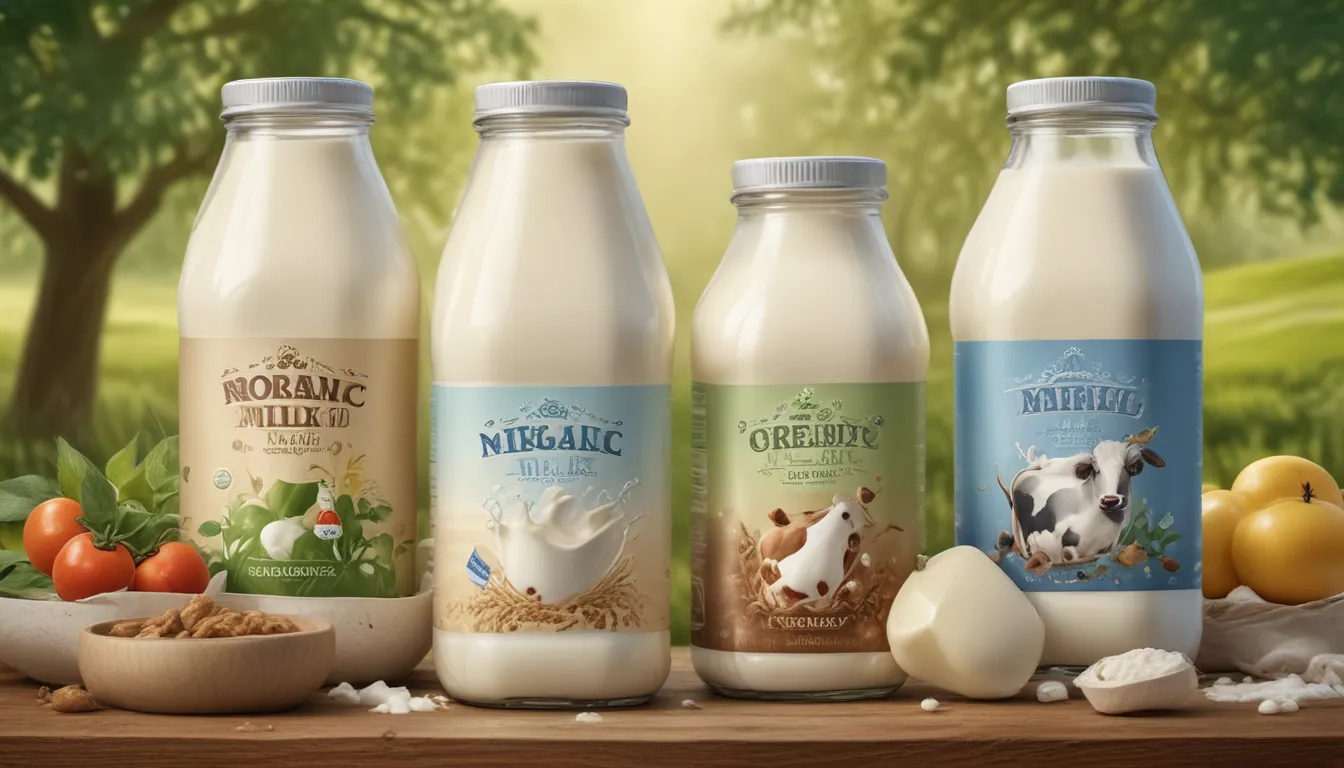The pictures in our articles might not always show exactly what the text is talking about. We use these images to make the article more interesting and eye-catching. They are there to add to the text, but not to replace it or show every detail.
Organic milk has garnered attention in recent years for its health benefits and environmental sustainability. This type of milk is sourced from cows raised on organic pastures, fed organic feed, and free from antibiotics and growth hormones. Not only does organic milk benefit the cows, but it also provides consumers with a nutritious and eco-friendly option.
In this informative guide, we will delve into 10 essential nutrition facts about organic milk, shedding light on its advantages and why it should be a part of your daily diet. From its nutrient content to potential health perks, organic milk stands out as a delicious, healthy, and environmentally conscious choice for all.
Discover the Benefits of Organic Milk:
- Organic milk is a nutrient powerhouse, containing protein, calcium, vitamins, and healthy fats vital for strong bones, muscles, and a robust immune system. Regular consumption of organic milk can aid in lowering the risk of osteoporosis, muscle recovery, and brain health, all while steering clear of harmful chemicals.
Packed with Protein
Organic milk boasts high protein content, making it an excellent source of this vital nutrient. Just one cup of organic milk provides about 8 grams of protein, essential for muscle growth, repair, and overall body development.
Top-Notch Calcium Source
When it comes to calcium, organic milk is a stellar choice. Calcium is crucial for maintaining strong bones and teeth, with one cup of organic milk offering approximately 30% of the recommended daily intake of this essential mineral.
A Treasure Trove of Vitamins and Minerals
In addition to protein and calcium, organic milk is rich in various vitamins and minerals such as vitamin D, vitamin B12, phosphorus, and potassium. These nutrients play a pivotal role in sustaining overall health and well-being.
Healthy Fats Specialty
Contrary to common beliefs, organic milk contains healthy fats like omega-3 fatty acids, beneficial for heart health and reducing the risk of certain diseases.
Supports Bone Health
Regular consumption of organic milk is linked to a decreased risk of osteoporosis, a condition characterized by weak and brittle bones. The calcium and vitamin D in organic milk contribute to bone health, mitigating the onset of this condition.
Boosts Muscle Recovery
Thanks to its high protein content, organic milk is ideal for muscle recovery post-intense physical activity. The protein-carbohydrate combo in organic milk makes it a perfect post-workout drink for replenishing energy stores and aiding muscle repair.
Enhances Immune System
Organic milk contains essential nutrients like vitamin A and zinc known for boosting the immune system. Regular consumption can help bolster a healthy immune system, reducing the risk of common illnesses and infections.
Rich in Electrolytes
Organic milk includes crucial electrolytes such as potassium, sodium, and magnesium, vital for maintaining proper hydration and ensuring normal bodily function. It's an excellent choice to rehydrate and replenish essential nutrients post-exercise.
Supports Brain Health
Nutrients in organic milk, including B vitamins, vitamin D, and omega-3 fatty acids, play a key role in brain health. These nutrients aid cognitive function, memory, and overall brain development.
Organic, Chemical-Free Goodness
A standout benefit of organic milk is its production without synthetic hormones, antibiotics, or pesticides. Opting for organic milk ensures consumption of a product free from harmful chemicals, promoting overall health and well-being.
In Summary
In conclusion, organic milk is a nutritious and wholesome addition to any diet. Its nutrient-rich profile, including essential vitamins, minerals, and fatty acids, makes it an excellent source of nourishment. Additionally, being free from synthetic hormones, antibiotics, and pesticides makes organic milk a safer option for consumers. Its eco-friendly advantages, such as supporting sustainable farming practices, further elevate its appeal. Whether consumed as a beverage, added to recipes, or incorporated into beverages like coffee and tea, organic milk provides an array of health benefits contributing to a balanced diet.
FAQs Answered
- What is organic milk?
-
Organic milk comes from cows raised on organic farms, fed organic feed, and not given antibiotics or hormones.
-
Is organic milk more nutritious than regular milk?
-
Nutritionally, organic milk is similar to regular milk but is produced without synthetic hormones and antibiotics.
-
Are there benefits to drinking organic milk?
-
Yes, organic milk features higher omega-3 fatty acids levels beneficial for heart health and lacks pesticide residue and antibiotics.
-
Can organic milk help with lactose intolerance?
-
Organic milk still contains lactose, so it may not be suitable for those with lactose intolerance, although some tolerate it better than regular milk.
-
Is organic milk more expensive?
-
Yes, organic milk tends to be pricier due to the higher costs of organic farming practices.
-
How long does organic milk last?
-
Organic milk, like regular milk, lasts one to two weeks when properly refrigerated.
-
Can children consume organic milk?
-
Yes, organic milk is safe for children and offers high-quality, nutrient-dense milk without hormones and antibiotics.
-
Is organic milk better for the environment?
-
Yes, organic milk production involves sustainable practices that prioritize environmental preservation.
-
Can I use organic milk in cooking and baking?
-
Absolutely! Organic milk can be used in cooking, baking, and various recipes just like regular milk.
-
Where can I buy organic milk?
- Organic milk is readily available in grocery stores, health food stores, from organic farms, and online retailers.
This education-rich guide provides insight into the benefits and advantages of organic milk consumption. With its nutrient-packed profile, eco-friendly production methods, and versatile applications, organic milk emerges as a wholesome choice for health-conscious individuals seeking a nutrient-dense daily supplement. Opt for organic milk today to savor the goodness of nature in each sip!






